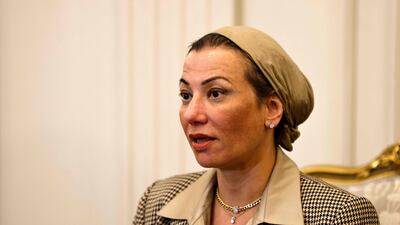Egypt is on course to ensuring 100 per cent of its national projects meet green criteria by 2030 as the Cop27 host seeks to be a role model for other African countries, a minister has said.
“Forty per cent of the national budget that funds our national projects is for green projects, and we’re increasing that every year,” Minister of Environment Yasmine Fouad told The National on the sidelines of the Egypt International Co-operation Forum in Cairo.
The three-day forum comes two months before the UN climate summit in Sharm El Sheikh.
African ministers of economy, finance and environment, along with climate leaders, development partners, the private sector, philanthropic foundations, think tanks and civil society, used the conference to focus on the continent’s common challenges and opportunities.
Through its Vision 2030 plan, Egypt set a goal of government-funded green projects reaching 50 per cent by 2025 and 100 per cent by 2030.
At the ICF opening on Wednesday, President Abdel Fattah El Sisi said the country will reach the 50 per cent target by 2024-2025.
The environment ministry has the task of making sure projects spanning all sectors, from transport to waste management, abide by sustainability criteria, Dr Fouad said.
For example, that means using natural resources, being energy-efficient, selecting renewables over fossil fuels and projects that fall under either the climate change mitigation or adaptation categories. If they do not meet the criteria, they do not receive funding.
In June, Egypt released its updated Nationally Determined Contributions, which are required from all parties to the Paris Agreement. They represent the ways in which countries intend to help limit global warming to 1.5ºC above pre-industrial levels.
Egypt has urged other African countries to release their NDCs before Cop27, as one of several goals to make the conference one that moves “from pledges to implementation”.
“A Cop for implementation would simply mean that we would need to ensure that the decisions made [at Cop26] in Glasgow will be fulfilled,” Dr Fouad said.
More specifically, “there was an urgency for countries to update their NDCs, so we need to see that momentum of more NDCs coming to the secretariat”, she said.
Furthermore, developed countries need to deliver on their commitments to double adaptation finance. The Santiago Network, which addresses “loss and damage” — compensation for the devastating effects of climate change — needs to be put into operation, she said.
Egypt accounts for only 0.6 per cent of global carbon emissions and the president has said the world’s top carbon emitters need to bear the lion’s share of responsibility in financing mitigation and adaptation projects.
In recent years the environment ministry has focused on air pollution and waste management issues, especially in the Nile Valley and Delta where about 95 per cent of the 103 million population lives.
Through a project with the World Bank, the ministry has linked industrial companies with an air quality network to monitor emissions.
The “black cloud” that historically was created by farmers burning rice husks in the fall season is no longer a problem, because they have been incentivised to recycle the waste.
“It has come to be a job opportunity,” Dr Fouad said.
The government is also spending 7 billion Egyptian pounds ($362 million) to overhaul its solid waste management infrastructure, she said.
Meanwhile, Egypt is trying to disperse its urban population through the development of new cities, such as its New Administrative Capital east of Cairo and New Alamein City on the Mediterranean coast.
“Building 14 new urban cities would mean the future generation will not be kept in that small area of the Nile Delta,” Dr Fouad said.
Other high-profile environmental campaigns include a plan to reduce the annual consumption of single-use plastic bags to 100 per person by 2025 and 50 by 2030, and an initiative to plant 100 million trees across the country.
At the ICF this week, Egypt launched its country platform for the Nexus of Water, Food and Energy programme, which provides opportunities for using finance and private investment to support the country’s green transition.
The Ministry of International Co-operation and the African Development Bank also outlined a “New Country strategy 2022-2026" to improve climate-smart agriculture practices and increase capacity for renewable energy generation.
Finally, the ministry and the Tony Blair Institute for Global Change collaborated on the Sharm El Sheikh Guidebook for Just Financing, which aims to translate financial commitments into implementable projects to support the climate agenda.


